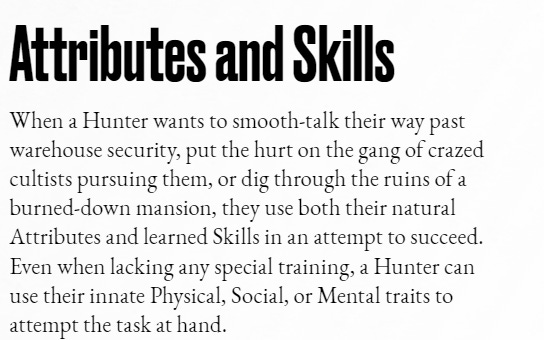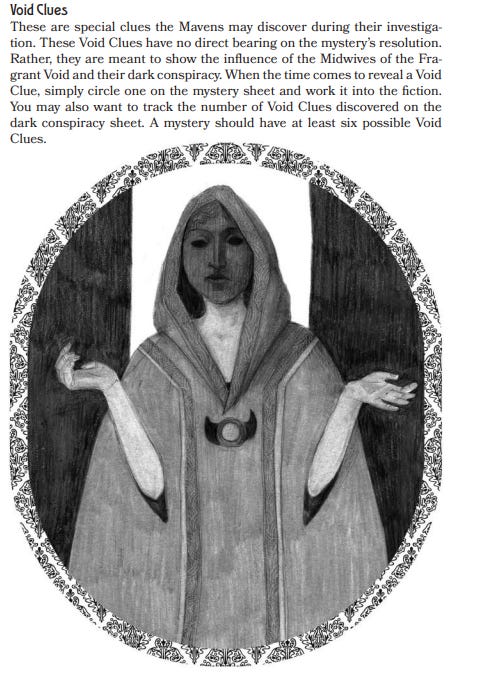Power fantasies abound in media, specially in an artform such as ours, where it is so easy to make our own — so we get the indulgencies we need and deserve. But power, well, power is a well, begotten by violence, information control and personal charisma — but in our current world is built on the first one1. Because our games are material, our imagination is a material product and we are prisoners of its forces, the power we can fantasize about is shaped by the exercise of power around us. We look at three classical acceptable targets of power fantasies in roleplaying games and try to see how they reflect the ways power is applied upon us to manage bodies, lives and minds.
The usual caveats apply2, and I further clarify what the is implicit in the previous paragraph: this is not some kind of value measurement/judgement of power fantasies, but reflecting on what the imaginary of power is allowed to be, the technologies it uses to perpetuate itself and how it has its reflections in the games and art we practice. Examples were almost random, picked from what was closest at hand when I was writing this because of how ubiquitous those ideas are — they are not a commentary on those individual games.
The Biopolitical Enemy: The Cultist
Forget everything else, THE acceptable violence target of roleplaying games is the cultist. Hateful creatures that stand against everything held sacred, who reject goodness, who have betrayed the world and would have it destroyed3.
You will have it waved in as a short-hand for someone whose personhood can be ignored — or whose personhood may be protected with violence against it! It is okay, you saving them from themselves! They are either alien themselves, or stand-ins for the most alien, the most you can be an outsider while still having a face. They are beyond morality and ethics — and thus beyond violence. Can you even call your attempts to exert power over them even violence? What you must do?

It is also an acceptable target that is ubiquitous: no matter the decade in which a game was made, setting, genre, you are going to find plenty of examples where you can find the neatly packed, worry-free, cultist-shaped shooting range target.

Okay, but it is even cultist? And they are so easily — and insistently — made abominable?
A cultist is anyone that is a member, supports, or is associated with a cult. A cult is one of the many social arrangements that is essential for the full range of social care, nurturing and self-actualization that humans beings require for being healthy human beings: the family, the community and the clan/cult/other configuration of social club456.
Biopolitics is the discipline of disciplinary (groan) power worried with the management of bodies. 7 It involves subjugation through the applications of technologies of biopower — health policies, state policing and schooling, regulation of matrimony and other familiar relations, heritage and inheritance control, women’s oppression and risk management backed by extensive census programs. Relational power from previous hierarchical systems gives way to these structures that both enable and require the Modern nation-state.
While this may seem like consolidation/new configurations of old oppressive structures — such as private-property, subjectivation and subjugation of women and the socially dead, — the nation-state takes over relational power with an imagined community supported by calcified institutions of discipline: the bank, the school, the prison, the factory, the border, etc. 8
Those disciplinary institutions seek to control space and where bodies are and can be to rule over the lives of those that have been made subjects; that requires them to displace existing ways humans (and bodies they are incarnated in) live. You know, those things we talked above: the family, the community, the clan/cult/social club.
It is not that biopower has some special hatred for the last one; if I have to speculate, I would propose that the family (through hereditary control, systematic oppression of women and private-ownership that leads to the accumulation of power in patriarchal figures with control over familiar subjects and propriety) and community (through enclosure, atomization and proletarization) were eroded/captured/spat out as a requirement for the emergence of biopower technologies of power and the Modern capitalist nation-state.
The cult, however, has an emancipatory potential that makes it specially dangerous to the continuation of the institutions that dispense biopower. While there is a near infinite configuration of what families and communities can be, and change is not only possible but the natural flow of those arrangements, those tend to cluster and be shaped by generational time and geological constraints. The clan/cult/social club has allowed humans for most of their existence to be free people: no matter how far from home you were, no matter your relationship to your kin and heritage, you will have people that will take care of you and support you as they would themselves. “Societies” spread out across continents, the clan/cult/social club folding time-and-space family and community limits like a social wormhole91011. This allowed humans to live in massive international societies, beyond the keen of any of the “big societies” of modernity; the passport of your clan/cult/social club is better than any from even the Imperial Core: it opens you to kinship, social care, shelter, food and anything else you may need on your journeys — no matter what drives you.
Such large meta-systems that overshadow any Empire are an obvious threat to nation-state projects — not to mention capitalism. Clans are sublimated into families; social clubs into community. Cults?
They must die12.
The adventuring party in many ways replaces the clan, cult and social club in a neat little package acceptable for biopower. They offer an alternative to family, kin and community, but with quite unique “relationships” — or rather, a negative space for relationships that is malleable by institutions and coercive pressures — that can be kept in check by institutions such as coin, class, experience and whatever scarcity is dangled in front of adventurers.
Biopower is well aware of the hypocrisy, that adventurers often do the very same things — or worse — that its institutions accuse cultists of doing. It is different when it is its guys. Even the totally-not-a-cult investigators of Call of Cthulhu are given free rein in their hunt for the true threat to biopowered society (the cultist); their passions with the Mythos are disregarded because they must answer to powers greaters than Dagon — credit rating, prisional system, academia and whatever what passes for mental health institutions.
And thus the adventurer is the idealized subject of biopower.
A final note before we finish for today and return next time with the necropolitical power fantasies: it is easy when talking about systems of power and the violence they perpetuate in such abstract terms that often come off as dismissive. When we acknowledge the systems are violent, we mean they are made of violence, exert violence and are maintained by violence. When biopower manages bodies, it manages bodies; it applies violence to them and uses them to justify the violence it applies.
It forcefully defines who is abled and denies those marked as disabled as lacking, designing the social and physical places to be hostile to them, to keep out of the sight, to reduce them as even a possibile body to imagine. It regulates queerness and the ways they are able to be embodied and expressed. It hides entire indigineous peoples in allowed bodies and spaces to be. It compiles meticulous parameters about which physical characteristics equate to personhood. This is why the cultist is always the infiltrator, the conspirator, that must exist outside of society and any participation within it is as a vile agent undermining it from within.
This is how the very body of the cultist becomes a battlefield for biopower13. The bodies of cultists are scrutinized for any way they may differ from the proper subjects, as justifications for the treatments at the hand of the power fantasies of adventurers, marked as a clear symbol of their Evilness.
Through sword and ritual, this power fantasy of biopower leaves no body unmanaged.
Weird enough, which is also used to constrain who can exert power the other two ways, and what can be knowledge and social graces.
Being an opinion is implicit to any critical analysis; I will rather die than be caught prescribing shit.
Perhaps the world needs to be destroyed; perhaps should we be so lucky.
Bird, Douglas W. et al. (2019). ‘Variability in the organization and size of hunter-gatherer groups: foragers do not live in small-scale societies.’ Journal of Human Evolution 131: 96–108.
Dunbar, Robin I. M., Clive Gamble and John A. K. Gowlett (eds). (2014). Lucy to Language: The Benchmark Papers. Oxford: Oxford University Press.
Brisch, Nicole (ed.). (2008). Religion and Power: Divine Kingship in the Ancient World and Beyond. Chicago: Chicago University Press.
Foucault, Michel (2007). Security, Territory, Population: Lectures at the Collège de France, 1977-78.
Foucault, Michel, (1977). Discipline and Punish : the Birth of the Prison.
Schmidt, Isabell and Andreas Zimmermann. (2019). ‘Population dynamics and socio-spatial organization of the Aurignacian: scalable quantitative demographic data for western and central Europe.’ PLoS ONE 14 (2): e0211562.
Sikora, Martin et al. (2017). ‘Ancient genomes show social and reproductive behavior of early Upper Paleolithic foragers.’ Science 358 (6363): 659–62.
Migliano, Andrea et al. (2017). ‘Characterization of hunter-gatherer networks and implications for cumulative culture.’ Nature Human Behaviour 1 (2): 43.
“Wait, is this imperial and colonial violence again?” And your me behind you “Always has been.”
As is their mind and identity, as this disciplinary technology of power does not distinguish these from “power”






